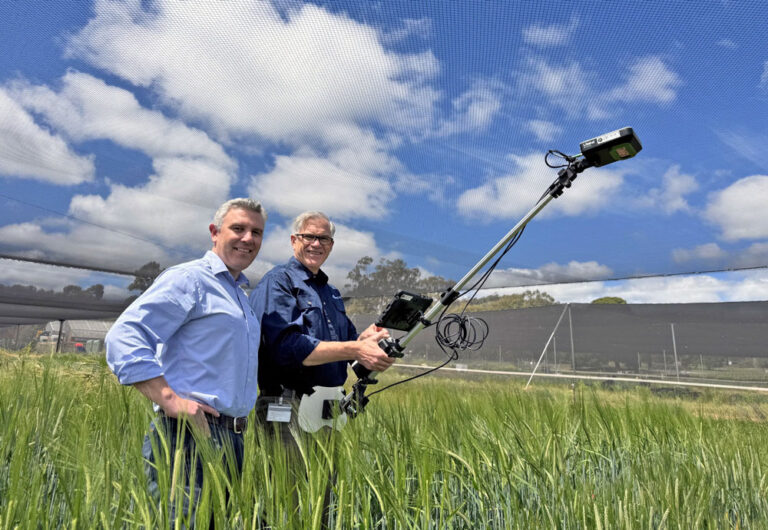Researchers have confirmed nitrogen fertilisers treated with inhibitors can maintain production while reducing GHG emissions

Research into on-farm greenhouse gas (GHG) emission reductions conducted by Incitec Pivot Fertilisers (IPF) and independent experts have demonstrated the ability of growers to maintain yields while reducing emissions associated with nitrogen fertilisation.
The production experiments and GHG assessments compared conventional nitrogen fertilisers with fertilisers treated with the nitrification inhibitor based on the active ingredient dimethyl pyrazole phosphate (DMP).
IPF Vice President, Agronomy & Innovation, Charlie Walker said evidence supporting the concept that nitrogen fertilisers treated with nitrification inhibitors can maintain production while reducing GHG emissions was important to demonstrate the benefits of Enhanced Efficiency Fertiliser (EEF) technology.
“Nitrous oxide (N20) is a potent GHG with a warming potential 273 times that of carbon dioxide (CO2),” Charlie Walker explained.
“Incitec Pivot Fertilisers is at the front line of helping farmers maintain or improve productivity while minimising GHG emissions through good agronomy and Enhanced Efficiency Fertiliser (EEF) technology.”
Research findings
2023 research undertaken as part of the Australian Department of Agriculture’s National Agricultural Nitrous Oxide Research Program demonstrated that N losses could be reduced without sweet corn yields being penalised, indicating extra costs associated with nitrification inhibitors could be offset by reduced fertiliser application rates (Muller, De Rosa et al, 2023).

The trial examined the effects of two nitrification inhibitors (DMPP and Piadin) on nitrous oxide emissions in nitrogen-intensive agricultural systems and found N loss could be reduced without impacting yields (Muller, De Rosa et al, 2023).
The findings support those from recent research by Incitec Pivot Fertilisers (IPF) on the impacts of DMPS in reducing nitrous oxide emissions.
The trial studied the combination of Enhanced Efficiency Fertilisers (EEF) eNpower®, a proprietary nitrification inhibitor formulation containing DMP, and Easy N®, a urea ammonium nitrate solution.
Results showed N2O equivalent GHG emissions (kg/ha) more than halved over 36 days as a result of applying eNpower on Easy N applied soil, compared to just using Easy N.
N2O is lost from the soil under high moisture conditions where bacteria use nitrate nitrogen as an oxygen source. This process is termed denitrification and can also result in significant nitrogen losses in the form of dinitrogen. Aside from contributing to GHG, denitrification also denies crops and pastures valuable nitrogen potentially impacting farm production and quality.
“DMP works by inhibiting nitrifying bacteria in the soil, slowing down the conversion of ammonium N to nitrate which is more prone to losses like denitrification and leaching,” Charlie Walker continued.
“Where nitrogen losses are minimised, there is the potential for growers to have a positive return on investment on the use of inhibitors such as DMP. Alternatively, growers may be able to reduce nitrogen inputs under some circumstances.

“Products like eNpower® are tangible tools available to growers today, as they work to develop strategies to reduce their GHG footprint while maintaining productivity and profitability.”
IPF’s latest research into DMP builds on previous research undertaken by other sectors on the emissions reduction potential of EEFs in sugarcane, cotton and vegetable crops.
2012 trials conducted on lettuce grown at Werribee in Victoria showed that different stabilised fertilisers can provide similar yields to standard commercial treatments while achieving much better outcomes for the environment (Melville, 2012)
“The Werribee trials showed N2O emission reductions of approximately 60% with both a NPK based compound and Urea based fertilisers,” Charlie Walker added.
Research conducted in the sugar industry by Wang et al (2016) showed DMP decreased annual fertiliser-induced N2O emissions by approximately 83%.
A celery trial conducted in 2022 by La Trobe University showed equivalent yields with a DMP treated farmer NPK blend, compared to a standard NPK blend, while reducing GHG emissions by 32%, in a situation where high rates of basal manure were applied.
“These results represented a reduction of N2O emissions of approximately 55%, which is significant”,” Charlie Walker outlined.
“Through our range of EEF products and ongoing investments in smart fertiliser research, we are excited to be arming farmers with the technology they need to meet the growing demand for food while reducing their environmental footprint,” Charlie Walker concluded.
See more on this research at this link, and how eNpower™ 18:20 contains the nitrification inhibiter DMP in IPF’s patented DMP-G formulation. DMP works by inhibiting nitrifying bacteria in the soil, slowing down the conversion of ammonium N to nitrate which is more prone to loss.













